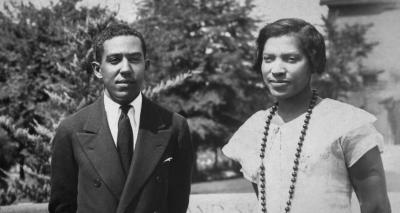Zora Neale Hurston: Claiming a Space (2023)

(c) PBS
Langston Hughes (left) and Zora Neale Hurston (right). For several years Zora was a good friend and collaborator with poet Langston Hughes.
Zora Neale Hurston was perhaps a genius born too soon, always an outsider, according to this fascinating documentary written and directed by Tracy Heather Strain.
The film goes into considerable detail of her work under Barnard Boaz, who had been changing anthropology from a pseudoscience justifying the superiority of the white race over African Americans. She also secured financial aid, actually a job, from white philanthropist Charlotte Osgood Mason. Flushed with enough money to buy a car and an expensive movie camera, Zora traveled south between 1927 and 1932. Visiting lumber camps and mines, she protected herself by strapping on a pistol. In Alabama she interviewed and filmed Cudjoe Kazzola Lewis, the last living slave brought from Africa aboard the slaver Clotilda just before the Civil War.
Zora published during this period numerous articles short stories, plays, and novels, “Their Eyes Were Watching God” being the most famous of the latter (and the only one that I have read). She used Negro dialect and resisted publishers wanting to change it to attract white readers. She became a leader in the Harlem Renaissance and a friend of Langston Hughes, though the two would split over their disagreements about the play they were writing together.
Her approach to anthropology was counter to the detached view of academics, she participating with her subjects in order to gain their trust. In one movie sequence we see her playing drums with a folk band. Her collections of folk tales, songs, dances, games, and interviews with African Americans in the South and Blacks in the Caribbean are highly valued.
